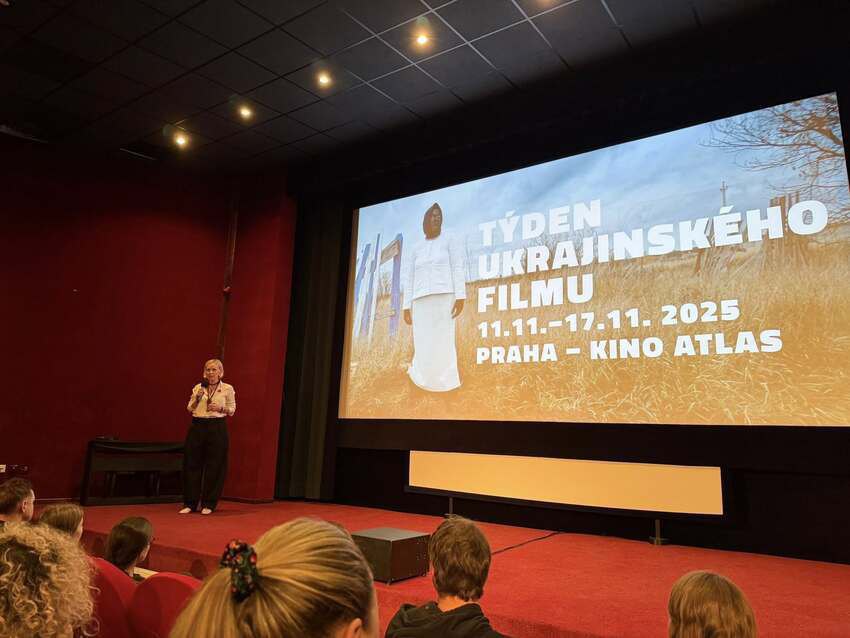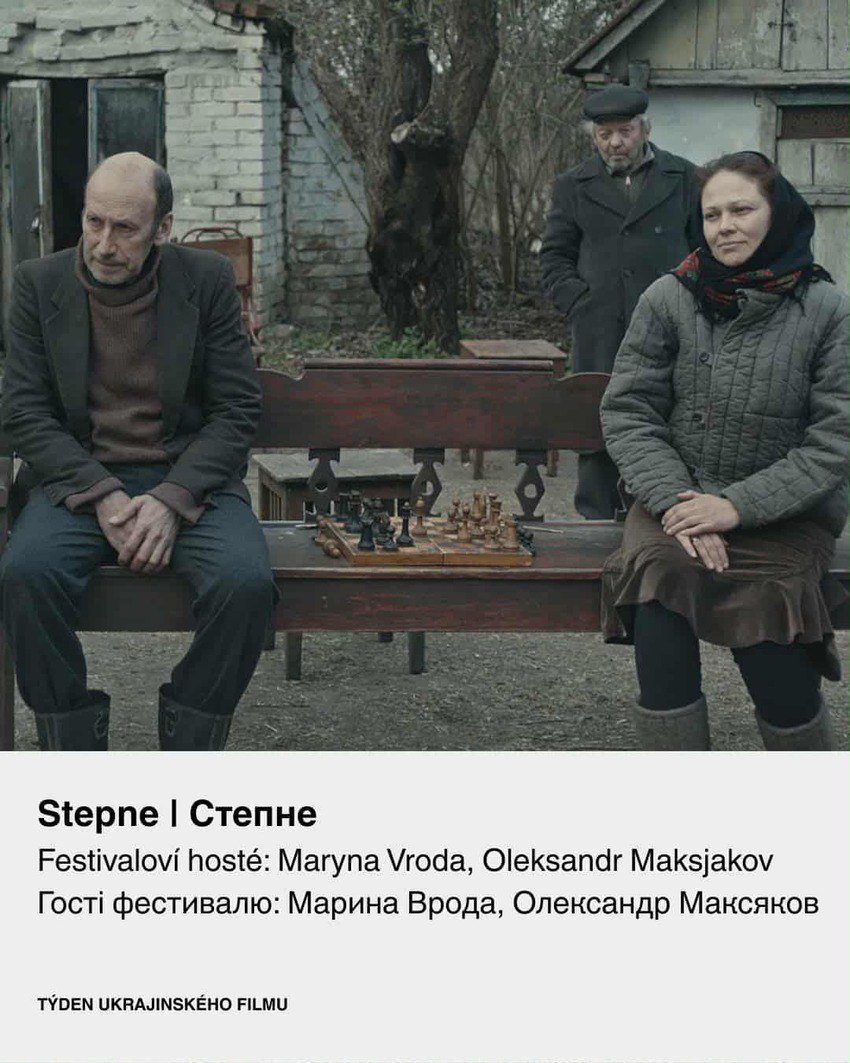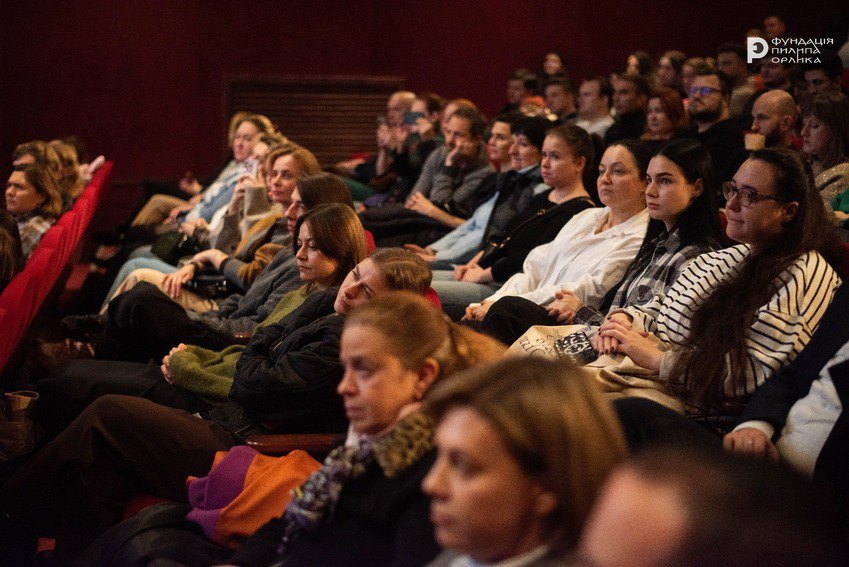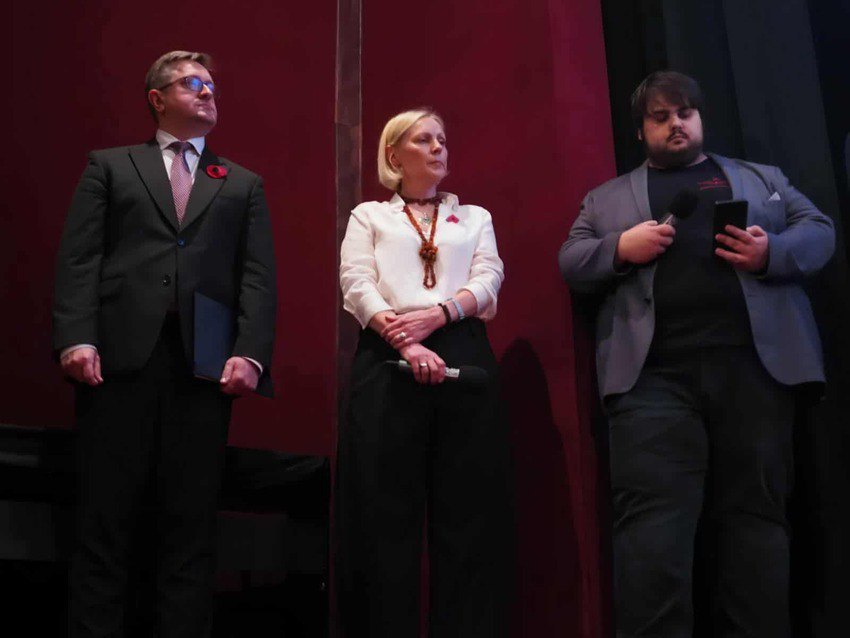The warmth of what is disappearing
Friday. November twilight. But not here. Near the Atlas cinema in the centre of Prague, it is bright, lively and noisy. Ukrainian can be heard, but Czech predominates. Ukrainian Film Week is taking place in this cosy arthouse space. The hall is full.

Today, they are showing the film Stepne by director Maryna Vroda. After its release in 2023, the film immediately received two awards at the Locarno Film Festival — for directing in the international competition and the FIPRESCI prize. In Prague, the last tickets were still available, while the previous screening — Malevich by director Darya Onyshchenko — had been sold out long ago. (The screening of Malevich on 13 November coincided with another Russian attack on Kyiv. And there was a certain symbolism in this: the aggressor country continues its plunder — from the names of artists and works of art to human lives.)

So while Kyiv was recovering from yet another blow from Russia, viewers in the Czech Republic were watching a film about Ukraine that had already gained recognition in the West and was soon to be released in domestic cinemas.
It is a film about an elderly man who returns to his native village to his dying mother. Searching, reflection, analysis — all against the backdrop of everyday life and routine. The highlight of the film is that most of the actors are not professional actors: these people live where they act, in a village near Lebedyn in the Sumy Region. It is one of many villages that are dying out. The language and stories of its inhabitants are real, and this helps to transport the viewer from the foreign cinema to a village in north-eastern Ukraine, damp from the winter drizzle and half-ruined. And if you never had a chance to record how your grandmothers and aunts sang, spoke, or lamented, this film will touchingly remind you of it.
The role of the main character, Anatoliy, was played by professional actor Oleksandr Maksyakov. He is from Dnipro, a city that suffers from Russian attacks almost every day, and after the screening, he met with the audience together with director and screenwriter Maryna Vroda. In response to a question about how it happened that the film features villagers rather than actors, he recalled:
“As for the actors in the crowd scenes, of course, there was no script, and in general, it was shot in almost one take, because we simply could not repeat it. It was a difficult shoot, we filmed for almost 12 hours. Everyone told their story, there were no retakes, and that became the script.”
Director Maryna Vroda noted that she was inspired to create the film and choose the filming location by her own family history, in particular her conversations with her father, who is from there:
“I needed Ukrainian land. Endless horizons. And these incredible faces of people and their stories. It was very important to find them, authentic ones. The script had two sentences about the memorial service, the brothers exchanged a few words — it was all there, but I dreamed of finding these documents alive, so that they could speak for themselves, because it is also about the unspoken and traumatised, about our heritage. You cannot find that near Kyiv. Maybe you could — but there are no such faces there.”
The terrible realities of the hungry post-war years of World War II — weeds eaten, ears of corn found in the field, survival — these are all true stories of heroes and heroines, which they tell each other at the memorial service, gesturing excitedly with their old hands near their wrinkled faces. The film crew films them.
Someone in the audience compared the film to the paintings of Ivan Marchuk, with his style of plontonism. Someone else saw too much hopelessness in it and did not see the eternal Ukrainian humour and cheerfulness that help to overcome everything in any circumstances.

“It is still a feature film. It is about something that is disappearing. And I deliberately avoided our Ukrainian beauties. I needed the warmth of something that is disappearing. Something fragile that, like us and our bodies, will one day disappear and give up its energy. In other words, it is warmth and disappearance at the same time. For me, this frank greyness is very beautiful. And very warm. That is my artistic vision,” replied Maryna Vroda.
This is not the first time she has touched on the theme of the Soviet past and its repercussions in her films. So this evening of her characters’ memories is like the long-awaited breaking of the silence of entire generations of Ukrainians, who were once silenced by the Soviet totalitarian regime.
“But there was a lot I did not understand in this film,” says a young Czech girl waiting with her companion for the green light at a crossing near the cinema. “But that is probably just their thing, Ukrainian,” she adds.
But that is what Ukrainian Film Week is for — so that we Ukrainians can be better understood.
“It’s important to talk about Ukraine”
Lenka Vikhova is a Ukrainianist and organiser of Ukrainian Film Week in Prague. We spoke to her about the importance of the Ukrainian voice, despite all the negative trends and Russian propaganda.
“It’s very important, and you know, I recently read on Facebook (may the author of these words forgive me for not remembering his surname): you know, there is a difference between the values professed in Western Europe and when a Ukrainian soldier decides to volunteer, because these are values in practice — he shows bravery and courage. And today is called the Day of Struggle for Freedom and Democracy, and these abstract words — freedom and democracy — are not eternal, they are not a given. Many Ukrainians are dying for them today,” she said.
Lenka is organising the Ukrainian film festival for the eighth time, having launched it in 2017 as part of cultural diplomacy. She called 2025 the year of farewell to the empire, because that is what the films presented at the festival are about.

“At the beginning of the year, we were concerned that there would be nothing to choose from, because in the first two years of the full-scale invasion, the films that had been started before the full-scale invasion were still being completed. So we were cautious, but it turned out that there was always something to show. It must be said that Ukrainian documentaries are of a very high standard. As director Mstyslav Chernov and critics say, this year is a golden year for Ukrainian documentary filmmaking. This is because Ukrainian documentary filmmakers are actually filming history as it unfolds before their eyes.”
The curator also explained the phenomenon with tickets:
“What I have observed is that in the first years of this festival, we were sure that tickets would sell because we knew that most of them would be bought by Ukrainians. But since the full-scale invasion, when Czech society became interested in Ukraine in order to understand what kind of country it is and what kind of people live there, it has exploded in this way — I am happy to see that we are constantly seeing new faces in the cinemas and already a lot of Czechs.”
In addition to the films mentioned above, there are also Grey Bees by Dmytro Moiseyev (2024), Time Stamp by Kateryna Hornostay (2025), Dzhura the King's Son by Anton Hoyda (2025), The Mousetrap by Serhiy Kastornykh (2025), Puppies by Oleksiy Yesakov (2025), and Kings of Rap by Myroslav Latyk (2021).
Czech interest in Ukrainian cinema
The final film of the festival was Honeymoon by director and screenwriter Zhanna Ozirna (2024). The world premiere took place last September at the Venice Film Festival. The thriller transported viewers to the beginning of the war in a town near Kyiv, which had been invaded by Russians. The characters woke up to explosions, did not have time to escape and found themselves trapped in their own apartment. Without communication, water or hope of rescue.
During the screening, there was, as they say, a deafening silence in the hall. Ukrainian viewers relived these terrible moments, while Czech viewers probably recalled their relatives’ stories about Soviet tanks on the streets of Prague in the late 1960s.
The film is powerful and disturbing, and it makes you want to reflect on it in silence.
The screening on 17 November coincided with the celebration of the Day of the Fight for Freedom and Democracy in the Czech Republic, commemorating the Nazi repression of students in 1939 and the dispersal of a student demonstration in Prague in 1989, which led to the Velvet Revolution.
“The war in Ukraine continues to pose a direct threat to the Czech Republic, and people must be prepared for the possibility that the conflict, in various forms, could reach the Czech Republic, President Petr Pavel said that day in an interview with Czech Television on Národní třída in Prague. Pavel arrived there with other politicians and citizens to commemorate the events of November 1989, which marked the beginning of the fall of communism in the country,” wrote the Czech newspaper Deník N.








